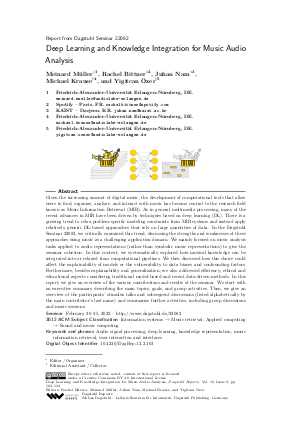Deep Learning and Knowledge Integration for Music Audio Analysis (Dagstuhl Seminar 22082)
Authors Meinard Müller, Rachel Bittner, Juhan Nam, Michael Krause, Yigitcan Özer and all authors of the abstracts in this report
-
Part of:
Issue:
Dagstuhl Reports, Volume 12, Issue 2
Part of: Volume: Dagstuhl Reports, Volume 12
Part of: Journal: Dagstuhl Reports (DagRep) - License:
 Creative Commons Attribution 4.0 International license
Creative Commons Attribution 4.0 International license
- Publication Date: 2022-08-23
File

PDF
DagRep.12.2.103.pdf
- Filesize: 3.92 MB
- 31 pages
Document Identifiers
Subject Classification
ACM Subject Classification
- Information systems → Music retrieval
- Applied computing → Sound and music computing
Keywords
- Audio signal processing
- deep learning
- knowledge representation
- music information retrieval
- user interaction and interfaces
Metrics
- Access Statistics
-
Total Accesses (updated on a weekly basis)
0Document
0Metadata
Abstract
Given the increasing amount of digital music, the development of computational tools that allow users to find, organize, analyze, and interact with music has become central to the research field known as Music Information Retrieval (MIR). As in general multimedia processing, many of the recent advances in MIR have been driven by techniques based on deep learning (DL). There is a growing trend to relax problem-specific modeling constraints from MIR systems and instead apply relatively generic DL-based approaches that rely on large quantities of data. In the Dagstuhl Seminar 22082, we critically examined this trend, discussing the strengths and weaknesses of these approaches using music as a challenging application domain. We mainly focused on music analysis tasks applied to audio representations (rather than symbolic music representations) to give the seminar cohesion. In this context, we systematically explored how musical knowledge can be integrated into or relaxed from computational pipelines. We then discussed how this choice could affect the explainability of models or the vulnerability to data biases and confounding factors. Furthermore, besides explainability and generalization, we also addressed efficiency, ethical and educational aspects considering traditional model-based and recent data-driven methods. In this report, we give an overview of the various contributions and results of the seminar. We start with an executive summary describing the main topics, goals, and group activities. Then, we give an overview of the participants' stimulus talks and subsequent discussions (listed alphabetically by the main contributor’s last name) and summarize further activities, including group discussions and music sessions.
Cite As Get BibTex
Meinard Müller, Rachel Bittner, Juhan Nam, Michael Krause, and Yigitcan Özer. Deep Learning and Knowledge Integration for Music Audio Analysis (Dagstuhl Seminar 22082). In Dagstuhl Reports, Volume 12, Issue 2, pp. 103-133, Schloss Dagstuhl – Leibniz-Zentrum für Informatik (2022)
https://doi.org/10.4230/DagRep.12.2.103
BibTex
@Article{muller_et_al:DagRep.12.2.103,
author = {M\"{u}ller, Meinard and Bittner, Rachel and Nam, Juhan and Krause, Michael and \"{O}zer, Yigitcan},
title = {{Deep Learning and Knowledge Integration for Music Audio Analysis (Dagstuhl Seminar 22082)}},
pages = {103--133},
journal = {Dagstuhl Reports},
ISSN = {2192-5283},
year = {2022},
volume = {12},
number = {2},
editor = {M\"{u}ller, Meinard and Bittner, Rachel and Nam, Juhan and Krause, Michael and \"{O}zer, Yigitcan},
publisher = {Schloss Dagstuhl -- Leibniz-Zentrum f{\"u}r Informatik},
address = {Dagstuhl, Germany},
URL = {https://drops.dagstuhl.de/entities/document/10.4230/DagRep.12.2.103},
URN = {urn:nbn:de:0030-drops-169333},
doi = {10.4230/DagRep.12.2.103},
annote = {Keywords: Audio signal processing, deep learning, knowledge representation, music information retrieval, user interaction and interfaces}
}
